Table of Contents
- Introduction
- Kamdhenu steel TMT bar price per kg
- Kamdhenu steel pipes price per kg
- Kamdhenu roofing sheets price per kg
- Kamdhenu wires price per kg
- Is Kamdhenu steel good or bad?
- Kamdhenu grades explained – PAS 10000, NXT and Fe 550 D
- City-wise Kamdhenu TMT prices – 2026
- Al-India price trail: what moved the needle
- Buying guide – 5 actions that pin down the sharpest Kamdhenu rate
- Conclusion
Kamdhenu Group sits firmly among India’s top steel producers. Its catalogue now stretches well beyond rebars. Alongside PAS 10000 and NXT TMT bars you’ll find structural sections, ERW pipes, binding wire and a full range of colour-coated roofing sheets.
Over the past year, steel prices have stayed volatile. Ex-yard prices for Fe550D TMT bars from Kamdhenu Limited have typically ranged between ₹52 and ₹78 per kg. Prices rose in late 2025 due to higher raw material and energy costs. In early 2026, rates eased slightly as freight and supply conditions improved.
Today, grade selection is not based on strength alone. Buyers now look for seismic resistance, corrosion protection, ductility, and better bendability. These factors are now common in most RFQs across infrastructure and construction projects.
The sections that follow set out the latest distributor rates, core mechanical properties and quick selection tips for the products contractors order most often. Keep them handy before you phone a mill or float a tender.
Kamdhenu steel TMT bar price per kg (2026)
The figures below reflect current distributor indications for Kamdhenu Limited TMT bars as of early 2026. Prices are slightly stable compared to late 2025, supported by steady construction demand and balanced billet costs. Infrastructure activity has improved, keeping market sentiment firm. Week-to-week price movement may still occur within a range of ₹0.50–1.50 per kg.
| Product | Specification | Typical price (₹/kg) |
| Kamdhenu NXT 550 rebar | Fe 550 | 54–59 |
| Standard TMT bar 8 mm | – | 53–56 |
| Standard TMT bar 12 mm | Fe 550 | 52–55 |
| TMT bar 8 mm | Fe 550D | 55–58 |
| TMT bar 10 mm | Fe 550D | 54–57 |
| Kamdhenu TMT bar 12 mm | Fe 550D | 53–56 |
| Kamdhenu TMT bar 16 mm | Fe 550D | 52–55 |
| Kamdhenu TMT bar 20 mm | Fe 550D | 52–54 |
| Kamdhenu TMT bar 25 mm | Fe 550D | 51–54 |
Note: Orders above 25 tonnes may qualify for an additional ₹0.50–1.00 per kg discount, depending on location and dealer liquidity. Prices are indicative, not final. GST, transportation, and freight charges are excluded.
Kamdhenu vs. other TMT brands price comparison (2026)
| Attribute | Kamdhenu TMT Steel – Fe 550 16 mm | Tata Tiscon TMT Bar | JSW NEO Steel Fe 550D 16mm TMT Bars |
| Typical grade range | Fe 500, Fe 550, Fe 550D. | Fe 500D, Fe 550D, 550SD. | Fe 500D, Fe 550D. |
| BIS certification | Yes | Yes | Yes |
| Brand positioning | Value–performance balance. | Premium primary steel. | Infrastructure-grade primary steel. |
| Common applications | Housing, mid-rise construction. | Seismic and premium residential projects. | High-rise and infrastructure projects. |
| Typical India price band (2026)* | ₹52–60/kg | ₹55–65/kg | ₹54–63/kg |
| Key strength focus | Corrosion resistance and ductility. | High purity steel, seismic performance. | Strength consistency and process control. |
*Indicative distributor-level market bands; actual yard prices vary by city, freight, and order volume.
Weight of a 12 mm Kamdhenu TMT bar
A quick rule of thumb: weight per metre equals the square of the diameter divided by 162. For a 12 mm bar:
- Weight per metre = (12 × 12) ÷ 162 ≈ 0.888 kg
- 12-metre stock length ≈ 10.66 kg
Use the same formula for any size; it keeps jobsite estimates honest.
Kamdhenu steel pipes price per kg (2026)
Demand for light- and medium-gauge structural pipes has stabilised this quarter. Prices remain slightly below the mid-2025 peak. Compared with late 2025, most Kamdhenu Limited MS and ERW pipes are lower by around ₹1–3 per kg, depending on size and region.
The figures below reflect ex-yard distributor indications as of early 2026. GST and freight are extra. Wall thickness and sectional weight may still change prices by ₹2–3 per kg, so confirm final specifications before placing an order.
| Product | Typical specification | Price range (₹/kg) |
| MS square pipe | 25 × 25 mm, 1.6–3.2 mm wall. | 50 – 55 |
| MS round pipe | 25 mm OD, 2.0–3.6 mm wall. | 60 – 65 |
| Square hollow-section (SHS) pipe | 50 × 50 mm, 3.2 mm wall. | 59 – 64 |
| Kamdhenu black pipe | 3 inch nominal bore, medium class. | 61 – 65 |
| ERW pipe | 1.2 – 2.8 mm wall, standard lengths. | 49 – 54 |
Note: For reference only. Prices are not to be considered as a final rate. GST, transportation and freight charges are not included. Please check with your steel supplier for actuals.
Pro tip: Orders above 20 tonnes, scheduled for direct mill dispatch, typically qualify for a ₹0.50–1.00 per kg rebate*.
Kamdhenu roofing sheets price per kg (2026)
Kamdhenu Limited manufactures a wide range of steel roofing sheets, including corrugated sheets, galvanised sheets, colour-coated sheets, and stainless steel roofing sheets.
In early 2026, colour-coated and galvanised sheets continue to follow hot-rolled coil price trends. Prices remain stable to slightly firm, supported by steady construction and industrial demand. They continue to command a premium over plain HR and CR sheets.
The figures below reflect ex-yard distributor indications across major Indian cities, including Mumbai, Delhi NCR, Bengaluru, Hyderabad, Chennai, Kolkata, Pune, and Ahmedabad, as of early 2026. Rates are ex-yard; GST and freight are extra.
| Product | Core specification | Typical price (₹/kg) |
| Colour-coated roofing sheet | 0.40 mm | 85 – 98 |
| Cold-rolled colour-coated sheet | 0.50 mm | 83 – 95 |
| Cold-rolled colour-coated sheet | 0.56 mm | 85 – 98 |
| Metal roofing sheet | 2 – 3 mm | 95 – 115 |
| GI roofing sheet | – | 82 – 105 |
| Galvanised iron roofing sheet | 10 ft × 32 in | 65 – 82 |
| Galvanised steel roofing sheet | – | 84 – 108 |
| Galvalume roofing sheet | 0.45 mm | 88 – 112 |
| Stainless-steel roofing sheet | – | 170 – 210 |
Note: For reference only. Prices are not to be considered as a final rate. GST, transportation and freight charges are not included. Please check with your steel seller.
Bulk orders (≥15 tonnes) or direct mill dispatch can reduce prices by another ₹1–2 per kg. Always confirm thickness, width, and paint coating mass before placing a purchase order.
Kamdhenu wires pricing per kg (2026)
Pricing for binding and barbed wire has remained firm in early 2026. This is despite softer long-steel trends. Zinc costs and scrap rates continue to support GI and barbed wire pricing. Compared with late 2025, dealer-level quotes are mostly stable, with a slight increase of around ₹1–2 per kg on common gauges.
The figures below reflect ex-yard indications from authorised Kamdhenu Limited dealers across major Indian cities as of early 2026. GST and freight are extra.
| Product | Typical spec | Price range (₹/kg) |
| Binding wire | 20 SWG, annealed. | 82 – 96 |
| GI binding wire | 20 SWG, zinc-coated. | 86 – 102 |
| Galvanised barbed wire | 12 × 12 BWG, 120 g/m² zinc. | 90 – 104 |
Note: For reference only. Prices are not to be considered as a final rate. GST, transportation and freight charges are not included. Please check with your steel seller.
Tip: Place orders in coil lots of 1 tonne or more: most mills offer a ₹0.50–1.00/kg break once you cross that threshold.
Is Kamdhenu steel good or bad?
Kamdhenu has built a solid track record for delivering specification-compliant steel at a price most contractors can stomach. Third-party lab tests and site data from metro and highway projects confirm that its rebars and sections meet, and often exceed, the declared mechanical values. That said, its franchise model spreads production across dozens of rolling mills; buyers must still demand heat numbers and mill certificates on every batch.
Benefits of Kamdhenu steel products
- PAS 10000 and NXT rebars provide ≥ 550 MPa yield strength and about 15 % higher bond strength thanks to a deeper double-rib pattern.
- Low residual stress from controlled tempcore cooling lets bars bend and re-bend without surface cracking.
- Copper-chromium chemistry and optional epoxy coating slow corrosion in coastal or industrial atmospheres.
- Carbon-equivalent levels stay low, so structural sections and pipes weld cleanly.
- Scrap charging and waste-heat recovery cut embodied CO₂ relative to 2018 baselines.
- Nationally published price lists make supplier quotes easier to benchmark.
Limitations to note
- Dimensional tolerances can drift at smaller franchise mills; random sampling on arrival is essential.
- Supply tightens in peak season, lengthening lead times in some regions.
- Rapid price swings can dent budgets. Negotiate rate-lock clauses or staggered dispatches where possible.
Kamdhenu grades explained – PAS 10000, NXT and Fe 550D
Builders rarely order “just any” rebar these days. Job-site exposure, seismic category and life-cycle cost all steer the grade decision long before a purchase order is raised. Kamdhenu keeps the choice straightforward by offering three flagship families whose strengths don’t overlap but rather dovetail.
PAS 10000
PAS 10000 sits at the top of the corrosion-resistance pile. A touch of copper and chromium in the melt, plus a carefully controlled cooling cycle, pushes salt-spray life well beyond the ordinary rebar curve. Coastal basements and water-treatment plants, places where chlorides never sleep, are where PAS 10000 earns its keep. Expect to pay roughly two to two-and-a-half rupees more per kilogram than the everyday Fe 500 benchmark, a differential most project engineers are happy to absorb once the repaint and patch-up savings are factored in.
NXT
NXT is the bar you pick when earthquake codes won’t cut you any slack. Its hallmark double-rib pattern bites deeper into concrete, trimming lap lengths by a handy margin and tightening crack control during cyclic loading. On paper its yield strength mirrors PAS 10000, yet the real-world draw is that extra 10-to-15 percent bond strength. Budget for a premium of one-and-a-half to two rupees over Fe 500 and you’ll be in the right ballpark.
Fe 550D
Fe 550 D, the workhorse of the trio, trades exotic chemistry for weldability and reliable elongation. With carbon kept low and impurities well checked, site welders can strike an arc without fretting over brittle joins. Factory sheds, slab-on-grade warehouses and mid-rise housing blocks lean on this grade precisely because it delivers strength without fuss. It usually commands just about a rupee over standard Fe 500 per kilo.
A quick tip before you lock quantities: Match each structural element’s exposure class to the grade above, then specify heat numbers, yield stress and elongation on the PO itself. You’ll thank yourself when the mill certificates land on your desk exactly as ordered.
City-wise Kamdhenu TMT prices – 2026
Latest distributor quotes reflect market indications as of early 2026. Figures shown are ex-yard, before GST and freight. Weekday price movement of around ₹0.50–1.00 per kg remains possible due to raw material and fuel cost shifts.
| City | 8 mm (₹/kg) | 12 mm (₹/kg) | Source mill/stockist |
| Delhi NCR | 55.5 | 53.5 | Sahibabad yard, NH-24. |
| Mumbai | 56.5 | 54.5 | Kalamboli coil yard. |
| Bengaluru | 57.5 | 55.5 | Peenya stock point. |
| Hyderabad | 55.8 | 53.8 | Jeedimetla depot. |
| Kolkata | 54.8 | 52.8 | Howrah stockist. |
| Chennai | 56.0 | 54.0 | Manali distributors. |
| Pune | 56.2 | 54.2 | Chakan stockist. |
| Ahmedabad | 55.8 | 53.6 | Changodar yard. |
*Yards are representative distributor stock points providing gate-level indications.
How to use these numbers
- Benchmark quickly – If your supplier quote sits more than ₹1.25/kg above the city’s mid-point, ask what add-ons are inflating the ticket.
- Book in tranches – Split large orders into two or three deliveries to hedge against this month’s ore volatility.
- Verify heat numbers – Insist on mill test certificates that match the price lot; franchise mills vary in finishing tolerances.
Weekly refresh: Prices are reviewed every Monday. The table is updated if movements exceed ₹0.50 per kg.
All India price trail: What moved the needle
Month-end yard prices for 12 mm Fe 550 bars
(Average of Delhi NCR, Mumbai, Bengaluru, Hyderabad, Chennai, Kolkata, Pune, and Ahmedabad)
| Month | Price (₹/kg) |
| Jan-25 | 57.8 |
| Feb-25 | 56.2 |
| Mar-25 | 55.0 |
| Apr-25 | 54.2 |
| May-25 | 55.6 |
| Jun-25 | 52.8 |
| Jul-25 | 54.0 |
| Aug-25 | 52.5 |
| Sep-25 | 49.8 |
| Oct-25 | 50.5 |
| Nov-25 | 51.0 |
| Dec-25 | 53.2 |
| Jan-26 | 55.0 |
| Feb-26 | 54.0 |
*Values are indicative blended yard levels based on distributor quotes across major Indian metros.
Methodology:
All-India benchmark based on averaged distributor yard prices across major consumption hubs. Prices are ex-yard, before GST and freight.
Key turns, in plain language:
- Year-end firming (Dec 2024) – Prices closed the year near ₹53–54/kg, recovering from earlier autumn softness.
- January 2025 spike – A short-lived raw material cost surge lifted prices sharply, taking them close to ₹58/kg within weeks.
- Feb–Apr easing – As supply normalised and project activity slowed temporarily, prices moved back towards the ₹54–55/kg range.
- Late-May support – Fresh infrastructure orders and improved scrap demand helped stabilise levels near ₹55–56/kg.
- Monsoon cooling (Jun–Aug) – Softer construction activity reduced buying interest, pulling prices into the ₹52–54/kg band.
- September softness – Weak demand and cautious procurement pushed prices to one of the year’s lowest levels, near ₹50/kg.
- Autumn stabilisation (Oct–Nov 2025) – Gradual restocking and project enquiries supported a mild recovery towards ₹51/kg.
- Year-end recovery (Dec 2025) – Infrastructure demand and distributor restocking lifted prices back above ₹53/kg.
- January 2026 uptick – A brief restocking cycle and firmer input costs pushed averages close to ₹55/kg.
- February 2026 moderation – Improved supply balance saw prices settle near ₹54/kg, signalling a more stable market environment.
Why these swings matter
Rebar rarely moves in isolation. A ₹1 per kg change in benchmark yard prices can quickly influence landed costs across other major markets. Plan cash flow with this lag in mind. Stagger large pours where possible, and lock in only the steel you can receive and use within about ten days.
Buying guide – 5 actions that pin down the sharpest Kamdhenu rate
- Draw a clean bill of quantities first. List every bar diameter, pipe size or sheet gauge by weight, not by running length. Suppliers quote faster and cheaper when the take-off is unambiguous.
- Build a three-quote stack. Phone at least two stockists and one direct mill desk on the same day, within the same hour if possible. That snapshot shows the true mid-market number before traders mark it up.
- Negotiate freight separately. Wrap the steel price and the lorry hire into distinct lines on the pro-forma. Diesel surcharges change weekly, and separating them prevents a late-stage bump from swallowing any discount just earned.
- Ask for a seven-day lock with staggered dispatch. Mills will usually freeze the per-kg rate for a week if the order exceeds 20 tonnes. Schedule deliveries in two or three batches to avoid site congestion and to hedge against a sudden slide in the spot market.
- Check the paperwork before the truck leaves. Heat numbers, mill test certificates and weighbridge slips must match the purchase order. Insist that the driver carries hard copies, and email scans to the site office the moment the trailer rolls out of the yard. A ten-minute check at source saves hours of dispute later.
Conclusion
Steel markets reward vigilance. A quick scan of yard quotes every Monday morning is usually enough to spot a drift before it drains the budget. If the number on the phone is more than a rupee above this week’s mid-point, ask what has changed in freight or ore. Keep freight, handling, and steel on separate lines in the purchase order; that simple split protects an agreed rate when diesel climbs mid-month.
Grade decisions should stay tied to exposure class: coastal basements merit PAS 10000, seismic cores lean toward NXT, everyday beams perform well with Fe 550 D. Lock the specification, collect three like-for-like quotes, and keep copies of mill certificates before the trailer leaves the yard. Follow those habits and the next progress meeting will focus on pour dates, not price disputes.
Generally, the pricing of steel products also changes depending on the quantity you buy. You may get a better discount on bulk purchases. If you are seeking to buy Kamdhenu products, check the Kamdhenu steel price list, get quotes, and select the best one.
*This article is for information only. Please check with your steel supplier/manufacturer for current prices, product details (dimensions, weight etc.) and any other specifications.
Looking to procure steel?
Tata nexarc helps manufacturers, builders and MSMEs source certified steel products, compare prices, and choose the right grade as per IS codes—with complete traceability and procurement confidence.
FAQs
Who is owner of Kamdhenu steel?
What is the origin of Kamdhenu steel?
- 1994: Registration of the company in September, 1994
- 1995: Kamdhenu Ispat Limited was founded by Mr. Satish Kumar Agarwal
- 1997: The brand launched its first rolling mill in Bhiwandi, Rajasthan and also received the ISO 9001:2000 status for quality management in steel production
- 2002: Introduced the franchise model to expand manufacturing capabilities without significant investments
- 2004: The company started its production of TMT bars
- 2005: The certificate for using the trademark ‘TEMPCORE’ was received
- 2006: First IPO launch with listings on BSE and NSE
- 2010: Launch of earthquake-resistant TMT bars focusing on safety and stability in seismic areas
- 2013: Launch of premium reinforced steel rebars, Kamdhenu SS 10000
- 2014: Launch of Kamdhenu structural steel
- 2015: Became the largest retail segment seller of TMT bars in India
- 2016: Official name change from Kamdhenu Ispat Limited to Kamdhenu Limited
- 2017: Launched Kamdhenu Nxt TMT bars
- 2018: Reached the milestone of 50+ franchisees across India
Does Kamdhenu supply mill test certificates (MTCs) with every batch?
What is the typical minimum order quantity (MOQ) for direct mill dispatch?
Is there a standard warranty period on Kamdhenu colour-coated sheets?
Can Kamdhenu pipes be ordered with third-party ultrasonics or hydro pressure certificates?
What storage life is recommended for epoxy-coated rebars?
How quickly does Kamdhenu adjust ex-yard prices after a major iron-ore move?
Can rebars be supplied in 10.5 m or 11 m lengths to reduce cut-off waste?
What is the approximate scrap credit per tonne when off-cuts are sold back to local yards?
Swati is a passionate content writer with more than 10 years of experience crafting content for the business and manufacturing sectors, and helping MSMEs (Micro, Small and Medium Enterprises) navigate complexities in steel procurement, and business services. Her clear and informative writing empowers MSMEs to make informed decisions and thrive in the competitive landscape.




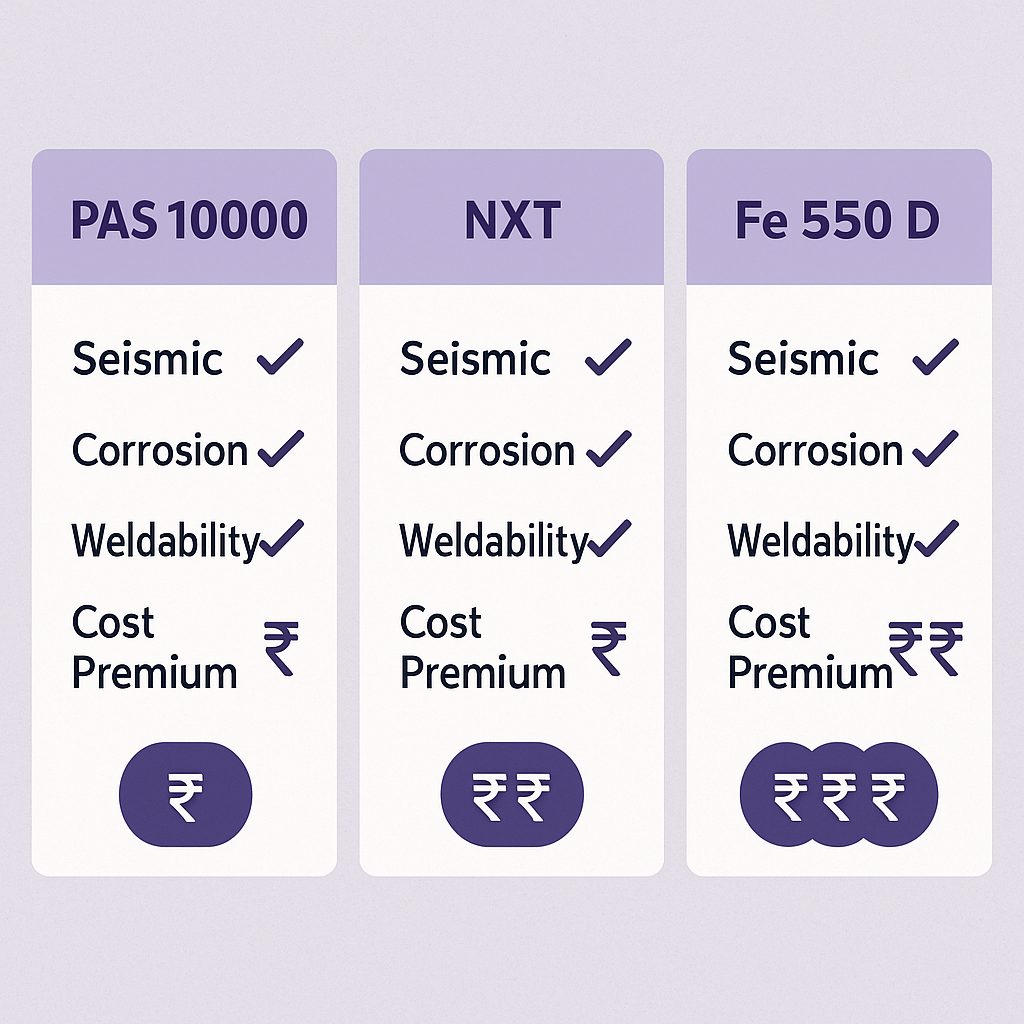
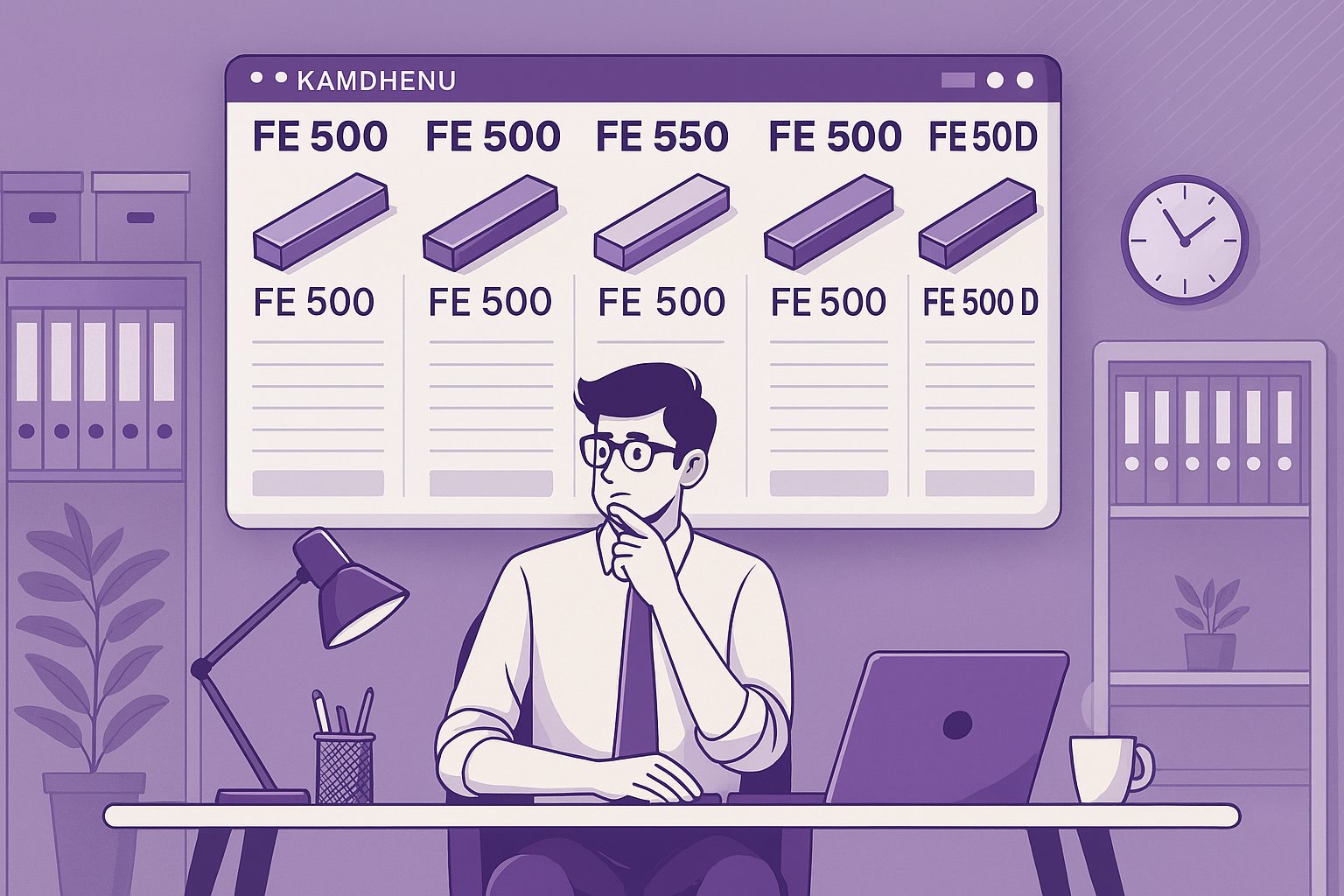

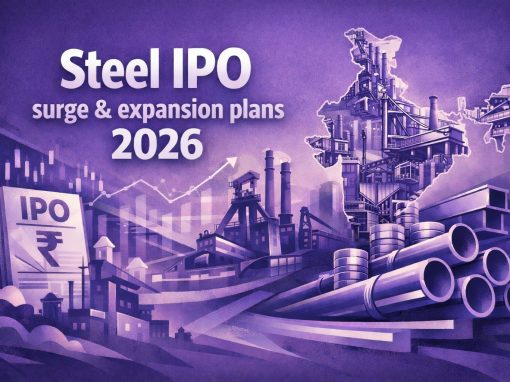
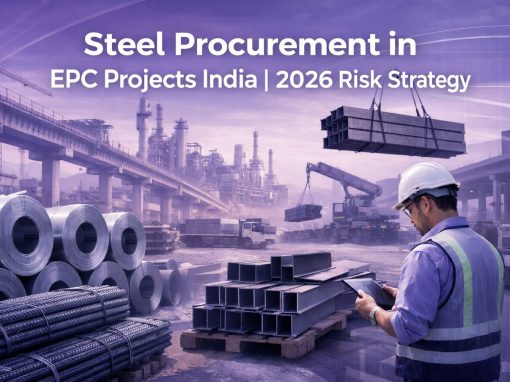
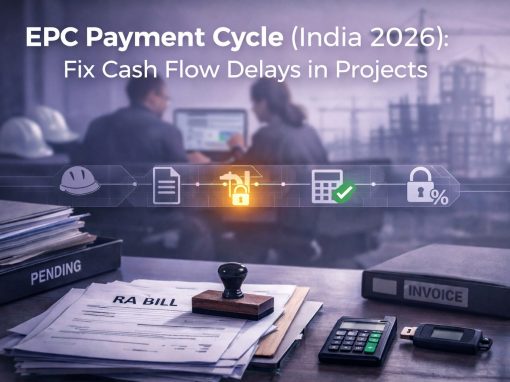
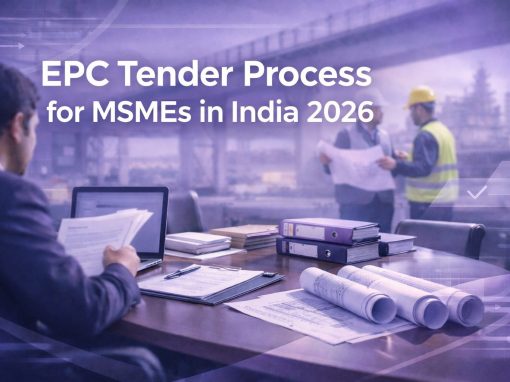
Is there a minimum order quantity required to avail bulk discounts? Also, does Kamdhenu directly sell to construction businesses, or do I need to go through authorized distributors/retailers?
To get the best deals, ask Kamdhenu about bulk discounts and if you can buy directly. They usually sell through others, but might sell to you directly if you’re buying a lot.
Can you recommend authorized Kamdhenu dealers in Pune who maintain a good inventory of the specific products I need (specifically Fe415, galvanized pipes)
Hi Avneet,
you can raise your requirement here – https://www.tatanexarc.com/steel/tmt-bars/tmt-bars-in-maharashtra/
The team will share the details directly to you.
Cut size required section beams, pipe, angle, channels, flat, bars etc at dealer price
Hi Nasar,
Please share your details, we will call you or give a miss call on +91 626 955 5606
I’m looking for Saria bars to build my house and have heard about Kamdhenu TMT as being a well rounded option. Which grade would be best for this?
What I found particularly helpful is how the pricing reflects the current market dynamics, especially with steel prices constantly fluctuating. In north India include Rajasthan, Kamdhenu is very popular for TMT bars need.